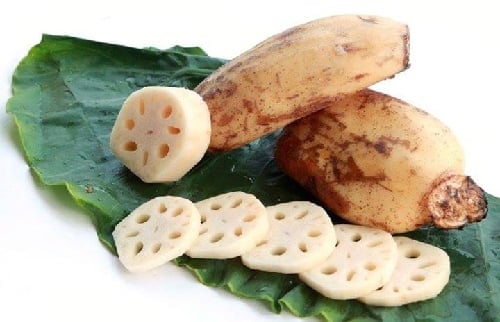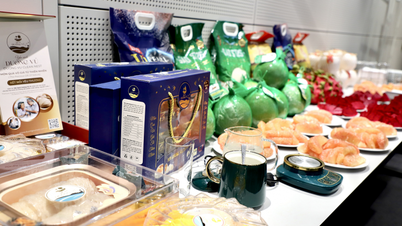GĐXH - Lotus root has a low glycemic index (GI), suitable for diabetics because of the high fiber content in lotus root, which helps support digestion and creates a feeling of fullness, thereby reducing food consumption...
Is it good for diabetics to eat lotus root?
Regarding the glycemic index of lotus root, this root has a Gl (glycemic index of food) of 33 and a glycemic load of 3, making it a low GI food. In the body, foods with a low GI value will be digested and absorbed slowly, while foods with a high GI value will be absorbed quickly.

Illustration
Regarding the effect of controlling blood sugar and reducing the risk of "accumulation" of blood fat, according to nutritionists, people with diabetes can eat lotus root because the high fiber content slows down the absorption of sugar in the body by reducing the digestion of carbohydrates. In addition, lotus root also enhances lipid metabolism, reduces fat absorption and contains 4.9 grams of fiber, which can meet up to 27% of your daily fiber needs, depending on age and gender.
Additionally, the high fiber content in lotus root aids in digestion and nutrient absorption, and promotes a feeling of fullness, thereby reducing food intake.
However, lotus root also contains a relatively high amount of starch (about 150 grams of cooked fresh lotus root has the same amount of calories as ½ bowl of rice). Therefore, diabetics who eat lotus root should pay attention to reducing the amount of staple foods such as rice, bread, starch... to control their blood sugar.
Benefits of lotus root for diabetics
According to Traditional Medicine, lotus root has a sweet taste, neutral properties, and the effect of nourishing the lungs, strengthening the spleen, and stopping bleeding. Studies have shown that lotus root has high nutritional content, bringing many positive effects to the health of users.
Nutrients in lotus root include: Protein, carbohydrates, fiber, B vitamins, vitamin C, calcium, important trace elements such as iron, copper, magnesium, manganese, zinc, potassium, phosphorus, sodium... Besides, many studies show that lotus root also contains many antioxidants, polysaccharides and polyphenols.

Illustration
In particular, lotus root brings many benefits to people with diabetes. This is a metabolic disorder characterized by blood sugar levels always being higher than normal, increasing the risk of cardiovascular disease, and causing damage to many other organs such as nerves, eyes, kidneys and many other serious diseases.
Initial experimental studies have shown that lotus root extract stimulates the pancreas to increase insulin secretion, reduce peripheral insulin resistance, and help stabilize blood sugar levels. In addition, lotus root is low in calories and rich in fiber, which is very good for people with diabetes who are overweight, obese, and have dyslipidemia.
In addition, sodium and potassium help regulate heart rate and blood pressure at a stable level. Vitamin C in lotus root is a very important antioxidant that maintains strength and integrity in organs, blood vessels and skin, contributes to collagen formation, and enhances the body's immune functions.
Diabetics need to know this when eating lotus root

Illustration
Do not eat raw lotus root
Because the living environment of lotus roots is mud, bacteria and worms can exist in raw lotus roots. If you accidentally get infected with them when eating, it will cause damage to the intestinal mucosa, stomachache, indigestion, diarrhea, facial swelling... Therefore, lotus roots need to be cooked before eating.
Do not eat lotus root with white radish
Lotus root and white radish are both cold foods. Eating these two foods at the same time will aggravate the cold condition of the spleen and stomach, easily causing stomachache or diarrhea.
Do not eat when you have a cold stomach.
Raw lotus root is cooling. For people with weak spleen and stomach, diarrhea, eating raw lotus root or cold lotus root will be difficult to digest, making the cold stomach symptoms worse.
Source: https://giadinh.suckhoedoisong.vn/loai-cu-duoc-vi-nhu-nhan-sam-co-chi-so-duong-huet-thap-nguoi-benh-tieu-duong-nen-an-de-keo-dai-tuoi-tho-172250109095101648.htm




![[Photo] Prime Minister Pham Minh Chinh chairs conference to promote public investment growth momentum](https://vphoto.vietnam.vn/thumb/1200x675/vietnam/resource/IMAGE/2025/5/20/7d1fac1aef9d4002a09ee8fa7e0fc5c5)

































































































Comment (0)